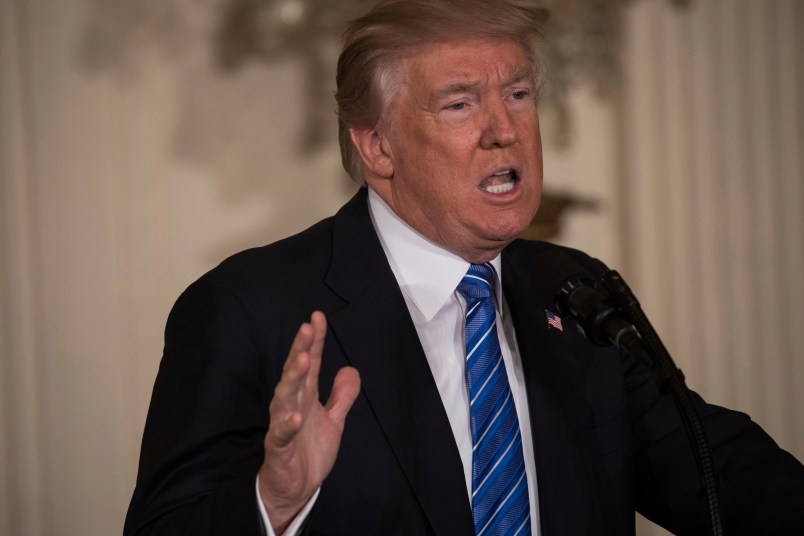WASHINGTON (AP) — President Donald Trump is likely to sign a tough new sanctions bill that includes proposed measures targeting Russia — a remarkable concession that the president has yet to sell his party on his hopes for forging a warmer relationship with Moscow.
Trump’s vow to extend a hand of cooperation to Russian President Vladimir Putin has been met with resistance as skeptical lawmakers look to limit the executive power’s leeway to go easy on Moscow over its meddling in the 2016 presidential election.
The House this week passed the legislation, 419-3, to enact new sanctions against Russia, Iran and North Korea, clearing the far-reaching measure for action by the Senate, where its future is less certain. Sen. Bob Corker, R-Tenn., had said he wants to re-examine the bill’s North Korea portion, potentially delaying it before legislators take their August recess. But late Wednesday he announced that he sees “a path forward on legislation to sanction Iran, Russia and North Korea” following “very productive discussions.”
The proposed measures target Russia’s energy sector as part of legislation that prevents Trump from easing sanctions on Moscow without congressional approval.
Two administration officials say that Trump is likely to sign the bill, despite ongoing wrangling over language and bureaucracy. Faced with near-unanimous bipartisan support for the bill in both the House and Senate, the president finds his hands are tied, according to two administration officials and two advisers with knowledge of the discussions.
The officials added that the president has been reluctant to proceed with the bill, even after it was revised last week to include some changes that American and European companies sought to ensure that business deals were not stifled by new sanctions. Trump has privately expressed frustration over Congress’ ability to limit or override the power of the White House on national security matters, saying that it is complicating efforts to coordinate with allies — particularly those in Europe that have taken a different approach to sanctions.
The administration officials and advisers demanded anonymity to discuss the private sanctions deliberations. Asked Wednesday about the president’s position on the bill, press secretary Sarah Huckabee Sanders told the AP, “the president strongly supports sanctions on Russia, Iran and North Korea,” but did not elaborate further.
“There is a tremendous and unprecedented effort by Congress to assert its influence on Russia and foreign policy because it does not trust the president,” said Elizabeth Rosenberg, senior fellow at the Center for a New American Security and a former senior adviser at the Treasury Department.
“Lawmakers are so distrustful of the administration that they are imposing requirements to conduct congressional review of attempts by the president to roll back sanctions, and in some instances prevent him from doing so,” Rosenberg said.
Lawmakers have been keen to implement a sturdy clampdown on North Korea’s confrontational actions — most recently after its first test of an intercontinental ballistic missile. They’ve also traditionally favored a policy that keeps Moscow in check for its own aggressive measures in Eastern Europe and Syria, as well as its efforts to disrupt elections in the U.S. and across Europe.
Earlier, Corker, the chairman of the Foreign Relations Committee, had objected to the House’s decision to include penalties targeting Pyongyang in the bill, saying he’d prefer to keep the North Korea sanctions in a separate measure. His comments sparked an immediate rebuke from Senate Democratic leader Chuck Schumer of New York, who blamed Republicans for “yet another delay … to prevent the bill from landing on the president’s desk before we leave for the recess.”
Corker said that “going forward,” the House has committed to quickly “consider and pass” modifications to the language of the North Korea bill.
Trump hasn’t threatened to reject the bill even though Secretary of State Rex Tillerson and other senior administration officials had objected to a mandated congressional review should the president attempt to ease or lift the sanctions on Russia. They’ve argued it would infringe on the president’s executive authority and tie his hands as he explores avenues of communication and cooperation between the two former Cold War foes.
Russia’s ambitions to be on equal footing with the U.S. suffered a setback in 2014 when the Obama administration authorized sanctions against sectors of the Russian economy, including financial services, energy, mining and defense. The administration also sanctioned people in Putin’s inner circle accused of undermining peace in Ukraine. Add to that falling oil prices and a weak ruble, and Russia’s economy was shackled.
Sanctions relief is important to Russia’s broader objective of superpower status, shown by its bullish Syria policy. Syria’s Russian-backed military made major gains in rebel-held eastern Aleppo in recent days and rebel resistance appeared to be crumbling. While Moscow and Washington are continuously at odds over Syria, the Obama administration did not impose any Syria-related sanctions.
Trump’s positions on Russia are generally hard to assess because he’s often stepped away from his more controversial proposals. In his meeting this month with Putin on the sidelines of the Group of 20 leading rich and developing nations summit in Germany, Trump said he repeatedly addressed the topic of Russia’s meddling in the U.S. election. But he never directly answered questions about whether he believed Putin’s claims that Russia had nothing to do with it.
“There is a bipartisan consensus to confront Russia across the board — from its actions in Ukraine, Syria, cyber, its election meddling — you name it,” said Boris Zilberman, a Russia sanctions expert with the Foundation for Defense of Democracies.
“Russia is the driving force in the sanctions bill,” he added. “So we see the legislative branch now trying to send a clear message to the executive branch on where they stand on the issue.”






